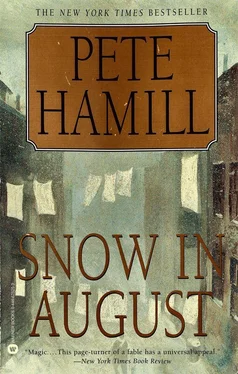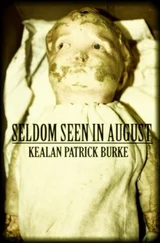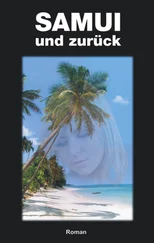“I love it,” he whispered. Kate smiled. Then the clerk returned, holding three glasses of tea. A wooden clothes hanger was tucked under his arm. He handed one glass of tea to Kate.
“Azoy shain!” the clerk said. Beautiful. “You look like a man.”
“We’ll take it,” Kate said.
“The hanger is free,” the clerk said, smiling and handing a glass of tea to Michael.
“A dank,” Michael said.
They clinked glasses in a toast.
“Lang leben zolt ir,” Michael said. Long life to you.
“God bless America,” said the clerk.
“Up the Republic,” said Kate Devlin, hugging her American son.
Back in the parish, Michael hurried to see Rabbi Hirsch to brag about his Orchard Street adventure. It was like a story out of a library book: he said the magic words and — Open, Sesame! — something amazing happened. It wasn’t Shazam! The words were Yiddish. Words that came from Rabbi Hirsch. But they had worked.
The synagogue on Kelly Street was locked. The front door remained sealed. He hoped the rabbi was all right, but the day was so fine, with the sky blue and the streets washed clean by the spring rains, that it didn’t seem possible anything bad could happen to anyone.
He walked around the front of the armory and looked at the bronze statue of the World War I hero with his small tin hat and wrapped leggings and wondered why there were no statues for the men who died in the Battle of the Bulge. Maybe it was too soon. Maybe they were making them in some studio or foundry, in Washington maybe, or in Paris, France, where the artists all lived. He sat on the steps and gazed at the green buds on the elm trees, and the sparrows chattering in the pale green branches, and wondered how far it was from Paris, France, to Prague. There must not be a ghetto anymore in Prague. The Nazis must have killed everybody who lived there. Then images of the camps unspooled in his mind, those newsreels he’d seen in the Venus, of hollow-eyed men and scrawny, skeletal women and bodies piled like the junk in Jimmy Kabinsky’s uncle’s yard. How could they have done that? How could anyone do that? And why didn’t anyone help? And where was God? How could He let so many people die? Men. Women. Babies.
And suddenly he thought: They must have killed the rabbi’s wife.
They must have killed Leah.
Of course! Those goddamned Nazi momsers must have taken her to the concentration camp. They must have put her in the gas chamber. Or starved her to death. Or shot her. Or buried her alive.
Of course!
That’s why Rabbi Hirsch sometimes glances at Leah’s beautiful face in that browning photograph and seems to feel such an awful sadness. And maybe that explains another thing. He told me once that when he was young, he tried to live without God. Then he went back to God and became a rabbi. He didn’t make a big deal about it. But it must have meant something to him, or he never would have mentioned it. Maybe now… maybe because of what happened to Leah, what happened to millions of other Jews, maybe now he has changed his mind again. Sometimes, the look on his face is… well, it’s not exactly confused. It’s not even unhappy, because in a minute he can change back again and teach me a new word in Yiddish or talk about Ziggy Elman. No: in that little flash, that glance, he looks… bitter. Like he’s pissed off at God. Or maybe even worse, like maybe he’s a rabbi who doesn’t believe in God.
Michael stood up, his stomach churning, wondering how he could have been so stupid, not to have thought of this before. He knew now that he had to ask Rabbi Hirsch about more than words, about more than distant Prague. He had to know what had happened to the woman named Leah, the rabbi’s wife. Had to find out her story. And the rabbi’s, too.
And then he saw Rabbi Hirsch in the distance, trudging heavily under the spring trees on Kelly Street in the block leading from the park. From that distance, he seemed small and vulnerable, in his black coat and black hat. Michael started to run to him. He wanted to tell him how sorry he was for failing to understand about his wife, Leah. He wanted to tell him a lot of things. And then he saw that Rabbi Hirsch was carrying two shopping bags. The rabbi’s face brightened as he saw Michael running toward him.
“Hello, Michael. Vos makhst du ?”
“Okay, good. Zaier gut, a dank ,” Michael said, taking the first shopping bag and reaching for the second. The rabbi pulled the second bag away, saying they could each carry one.
“You’ll never believe this,” Michael said in an excited voice, “but we saved three and a half dollars on a suit today because of Yiddish !”
He told the story while the rabbi unlocked the door. The rabbi was chuckling, asking Michael to repeat the Yiddish phrases, as they went to the kitchen and placed the shopping bags on the table. The boy glanced at the photograph of Leah, but he could not ask about the way she had died. The rabbi seemed too happy. They unpacked two bottles of wine and boxes of matzoh and three cans of soup.
“What’s all this for?” Michael asked.
“ Pesach . How you say it in English? Pissover?”
“ Pass over,” Michael said. “ Piss over, well, piss is the word for, uh, urinate. And—”
They briefly discussed the phrases taking a piss and pissing in the wind and being pissed off . And when they finished laughing, the rabbi told Michael about Passover. He explained about the time when the Jews were slaves in Egypt and how God sent a series of plagues against the Pharaoh to convince him to free the Jews. The tenth plague was the last one, and the worst of all. It killed only the firstborn children of Egyptian families. But the Angel of Death passed over the homes of the Jews. The angel knew which homes were Jewish because they had been marked on the doorposts and lintels with the blood of a lamb. Michael was thrilled at this tale; a magic sign had saved them. When this happened, the pharaoh finally got the point and decided to let the Jews go free. Michael tried to picture the Angel of Death, soaring above Egypt, with black wings and a ferocious, stern face, like the statue of Moses he saw in the encyclopedia. He pictured the weeping Egyptian mothers. He saw the Jews gathering at dawn, to head north to the land of milk and honey.
“Ever since, we gather on the… anniversary? Yes, the anniversary, to celebrate and to give thanks to God. Eight days it lasts. A big dinner we have the first night: a seder. The family, the friends, everybody eats and prays. Pesach — Passover, the great feast of the spring. The feast of the free.”
“Maybe Jackie Robinson will have the same kind of dinner next year,” Michael said. “A seder.”
“If he lives in Brooklyn already, we tell him, Jackie, come here.”
“Wouldn’t that be great?” the boy said.
The rabbi tapped the Brooklyn Eagle . “See, he is coming to the other land of milk and honey. Brooklyn!” He balled his hands into fists and held them together as if gripping a bat. “This year in Jerusalem!”
They both laughed. The rabbi hefted the package of American matzohs.
“To Egypt, everything goes back,” he said, opening the package, sliding out a matzoh, and handing it to Michael. “The matzoh, for example. The Jews, when they get the news from the Pharaoh they can leave, they don’t want to give him time to change the mind. But they don’t have time for the bread to—” He made an expanding gesture with his hands. “To get fat?”
“To rise.”
“Yes: to rise. So they grab what’s there already. Bread that haven’t rise. This.” He held up the cracker. “Matzoh.”
Читать дальше












